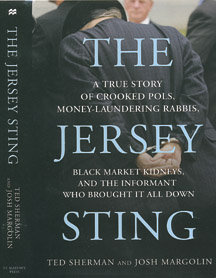The Jersey Sting reads like a true crime tale of politics, power, money, and greed. Released last month in hardback, the book by Star-Ledger reporters Josh Margolin and Ted Sherman is a behind-the-scenes account of the historic arrests of 44 public officials and religious leaders, most of whom were based in New Jersey, and most of whom were prominent Democrats and rising stars in the party. Two others would later be arrested in connection with the same investigation that ensnared the first 44.
Fallout from the arrests reached all the way to the Obama White House and aftershocks continue to reverberate through New Jersey’s political scene nearly two years later.
By now, the outline of the story told in The Jersey Sting is well-known.
It wasn’t long before Nobile made Dwek an offer he couldn’t refuse.
________
But there are still lingering questions about the sting operation, including how was Dwek positioned by federal authorities to become a cooperating witness, and was the operation used to break the Democratic Party ahead of the 2009 fall elections? Sherman and Margolin try to answer some of these questions.
As state government reporters for the Star-Ledger, the pair had extensive access to many of the key players who either participated in the investigation, were arrested, or were affected. They used this access to gain new information to fill in some of the gaps still left in the public record.
A substantial portion of their story focuses on Dwek, who until recently was still a somewhat shadowy figure about whom little was known, even though he was central to Operation Bid Rig and has testified at a few of the trials of those arrested. Sherman and Margolin give a detailed account of Dwek’s pre-cooperating witness days, when he was still a Ponzi-scheming real estate con man.
“Solomon Dwek was musing aloud about an old scam he had once run – one he had figured out after discovering that most banks were more interested in giving money than in learning where any of it went,” Sherman and Margolin write. “He would take out huge loans for property that did not exist, just by making up the block and lot numbers. The bank often did not do a title search. They didn’t check anything. If a loan officer questioned it, Dwek would just say they had mixed up the numbers.”
But defrauding banks – and members of his own family – eventually left Dwek owing millions of dollars with no one in his inner circle to whom he could turn to bail him out. When the loss prevention division at PNC Bank finally became suspicious of Dwek’s activities and filed a suspicious Activity Report with the U.S. Treasury’s Financial Crimes Enforcement Network, Dwek knew his days as a con artist were over and the FBI would soon be contacting him.
Dwek’s fraud case came to the attention of Assistant U.S. Attorney James Nobile, head of the public corruption unit, before he was even picked up by the FBI. By the time Dwek was finally arrested, Nobile was already lobbying to get him assigned to his department.
“Nobile forgot nothing and saw pathways in cases that others would often overlook,” Sherman and Margolin write of Nobile’s early interest in Dwek. “By far one of the most capable prosecutors in the office, he commanded a respect that led few to challenge him – including his own bosses. He wanted Dwek for special prosecutions but refused to say exactly why…Typically a bank fraud would have immediately been sent to the commercial crimes division of the U.S. Attorney’s office. This seemed like an open-and-shut case of check kiting, and some in the front office questioned why [Nobile] would want any part of it. Nobile insisted. Dwek ‘is a name I’m interested in’ was all [Nobile] would say.”
It wasn’t long before Nobile, working with the FBI and using the power of his office, made Dwek an offer he couldn’t refuse. From that point until the July 2009 arrests, Dwek would use his knowledge of real estate and his skills as a con artist to work a new scam, this time with the full blessing of the federal government.
Lucrative meetings
After tracing Dwek’s history and first meetings with the FBI, Sherman and Margolin give a lively account of his meetings with New Jersey politicos.
The Jersey Sting is a must-read for government and politics junkies who love books like The Soprano State. (And there’s a terrific “Cast of Characters” listing at the back of the book that’s helpful for keeping track of the major players.)
But just as history books are written by the victors, some of Sherman and Margolin’s book feels a bit skewed by their seeming reliance on prosecution documents and sources. Thus, there are still questions readers have that remain unanswered by this book.
In any case, it’s terrific read by two Pulizer Prize finalists and an important contribution to understanding not only the inner mechanics of Operation Bid Rig, but public corruption in New Jersey in general.
The Jersey Sting, available from St. Martin’s Press, is $26.99 (hardback).
E-mail E. Assata Wright at awright@hudsonreporter.com.
